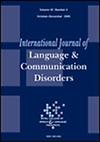Trends in the Acquisition of Clinical Reasoning in the Assessment of Speech Sound Disorders: Using the Script Concordance Test
Abstract
Purpose
Clinical reasoning is essential for speech–language pathologists (SLPs) when addressing ill-defined questions in various clinical settings. This study focuses on the acquisition of clinical reasoning skills in SLP students, particularly their evolution with clinical experience. To achieve this, the study developed and validated the first cloud-based script concordance test (SCT) tailored for assessing clinical reasoning skills in SSD diagnosis.
Methods
An expert panel of 15 SLPs (average experience of 20.3 years) helped develop and score the SCT, which was administered to 51 undergraduate students (22 sophomores, 18 juniors, and 11 seniors). Statistical analyses examined the predictive role and trend of clinical experience in three dimensions (utility, interpretation, and diagnosis).
Results
A significant difference in mean SCT scores was found between the expert panel and student groups (p < 0.05). Trend analysis showed a significant impact of clinical experience on SCT performance across all dimensions (all Fs > 9.91, p < 0.001), with greater experience linked to better reasoning skills. Low-scoring items highlighted challenges with stimulability testing, indicating a lack of clinical consensus.
Conclusions
This study demonstrates that clinical reasoning skills in SSD assessment become more refined with accumulated experience. The SCT developed effectively differentiates reasoning abilities between experts and students, offering a valuable tool for advancing clinical decision-making in speech–language pathology. These findings have practical implications, empowering SLP educators to design effective training programs and preparing students for the challenges they may face in clinical practice.
WHAT THIS PAPER ADDS
- The knowledge base of clinical practitioners includes both content and its organization. Clinical reasoning is the cognitive ability to integrate, organize, and interpret information as a key aspect of expertise in evidence-based practice. Recently, script concordance tests, which use case-based scenarios to reflect clinical decision-making processes, have become a popular method for assessing these reasoning skills.
- This study is the first to empirically show that clinical reasoning skills in speech–language pathology, particularly in assessing speech sound disorders, are progressively refined through clinical experience. It highlights that students’ reasoning skills during internships appear to be influenced by supervisory clinical approaches, potentially affecting diagnostic abilities. These reasoning skills may improve with further clinical experience or targeted continuing education. Additionally, the study developed the first SCT focused on SSD evaluation, demonstrating its effectiveness in distinguishing between expert and student clinical reasoning and decision-making abilities.
- A recent goal in clinical education is to make clinical reasoning processes more explicit and structured during training. Creating comprehensive case assessment scripts and designing concrete clinical thinking guidance programs integrated with effective measurement, such as the SCT developed in this study, could serve as teaching objectives for the clinical diagnosis of SSD.

 求助内容:
求助内容: 应助结果提醒方式:
应助结果提醒方式:


